Intervention or peacekeeping?
Hungarian revolution led to interethnic strife and bloodshed
Peacemaking, as part of international politics, arose after World War II. But peacekeeping operations were carried out much earlier. AT stories There is a lot of evidence when the armed forces of a third party separated the warring parties. Something similar happened in 1849, in Hungary and Transylvania. Of course, it was not peacemaking in the modern sense of the word. But one of the semantic motivations of the participation of the Russian army in a war not on the territory of Russia was in the defense of the Slavic peoples of the Austrian Empire.
After the triumph of the Marxist-Leninist ideology, the operation of the troops of Ivan Paskevich, carried out in the spring-summer of 1849, was traditionally regarded as the crown of the atrocities of autocracy. Russia, Emperor Nikolai and Paskevich himself became known as the “gendarmes of Europe”.
But such an assessment overlooks the multinationality of the Hungarian kingdom, and in the meantime the national minorities, which constituted the majority of the population (Croats, Germans, Romanians, Slovaks, Ukrainians in Transcarpathia), were afraid of Hungarian chauvinism and opposed the revolution. And to attribute the defeat of the revolution to the intrigues of the Habsburgs or the tsarist intervention will be superficial. All events need a balanced assessment - not to justify them, but to find the truth.
Soviet textbooks indicated that the Magyars, excited by the next Parisian revolution and the overthrow of Louis-Philippe Bourbon, began to fight for independence. And the real Hungarian patriots Miklos Vyshcheleni, Shama Yoshik, Gyorgy Upponi, Lajos Battyani, Lajos Kosuth, Sandor Petofi were engaged in this business. The bloodthirstiness of the latter in the form of a rhymed work with an optimistic title “On the gallows of kings” was even recommended in the USSR for study.
About the fact that, inspired by similar verses and words, the Magyars began to engage in total bloodletting throughout the empire, they were silent in the textbooks of victorious Marxism.
But what was happening on the banks of the Danube at that time?
Liberalism plus Magyarization of the whole country? The Hungarian revolution "lifted up" the whole "patchwork empire". Undoubtedly, most of the requirements (12 points) carried in themselves progressive trends of liberalism. The question of national liberation was very acute. The Hungarians were part of the empire as the Hungarian kingdom, which has members of the Sejm and a number of privileges, and with the beginning of the revolution, the government extended its appetites to Croatia, Transylvania and Vojvodina. The Principality of Transylvania, or Semigradiye, became part of the Hungarian kingdom as early as the 11th century and was a unique ethnic cauldron. The lands were directly subordinate to the crown of the Habsburgs with the unshakable rule of the Magyar nobility. In addition, Saxon Germans and a resettled ethnic Magyar group of Seklers or Szekeis, who had a zealous and aggressive disposition, lived here.
Ethnic raznotsvete was complemented by raznotsvetemi religious: Magyars were Catholics and Calvinists, half of the Vlach preserved Orthodoxy, the other adopted Uniatism, the Germans were Lutherans.
“The four described tribes, so diverse, lived on such a close stretch of land, shunning each other. Several hundred years they could not bring them together: the neighbor did not recognize the neighbor’s language, he never intermarried; the same city is called every tribe in its own way. Such relationships, of course, gave rise to distrust, enmity, contempt, or hatred of one nation for another. ” So Semigradiye was described by officers of Paskevich’s army.
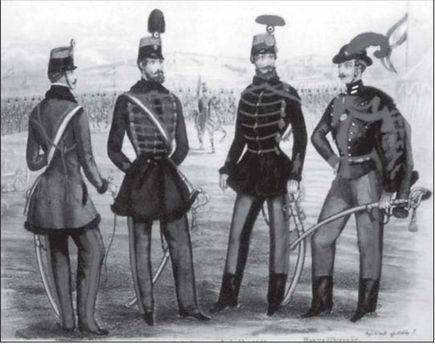
The beginning of the revolution was perceived positively, but when it became clear that the Magyar landlords did not intend to allocate land for them, and the “Pest Program” provided for a categorical union of Transylvania with the Hungarian kingdom, the local population began to grumble.
Already in March 1849, at the all-Romanian meeting, the vlachs swore allegiance to the “Emperor of Austria and Grand Duke of Transylvania” to Ferdinand and the Romanian nation and vowed to protect it from “any attack and oppression”.
At the same time, the ban (ruler) of Croatia, Josip Jelacic, spoke out against the Magyars, demanding the creation of a Triune (Austro-Hungarian-Croatian) state. In Vojvodina, the Serbs went against the Hungarians, but the greatest clashes took place in Transylvania.
First blood. The first clash occurred in the village of Mikhaltsy, where peasant vlachs seized the land of the landowner Magyar. A squad sent to suppress, consisting of Szekei, committed a real pogrom with brutal murders.
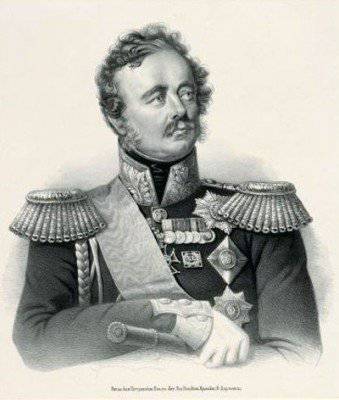
When the Magyars tried to recruit an army of residents of the Vlach villages into the army, they began to create self-defense units, where they invited the grand soldiers guarding the border. A civil war began in which Vienna supported the Vlachs and the Germans.
The well-armed Szekes and the Honved militia launched large-scale repressive actions. Dughamel’s dispatch stated: “The German and Wallachian population enthusiastically united around the Austrian flag, while the Seklers recognize only orders originating from Pest. Hostile actions began on both sides ... Where the Vlachs are the strongest, they commit unheard-of cruelties towards the Hungarians; the Hungarians, for their part, cut the Vlachs wherever the latter are in the minority. This is a terrifying racial war. The Sekler, although in number and inferior to the Vlachs, are almost accustomed from early childhood to the craft associated with weaponsand much more militant than the latter. "
At the same time, intelligence reported that in Transylvania, Russians were waiting for help. The quartermaster of 5 Corps, Colonel Nepokichitsky, informed: “Everywhere in Transylvania Russian troops are looking forward to and only people are waiting for salvation from our armed intervention.”
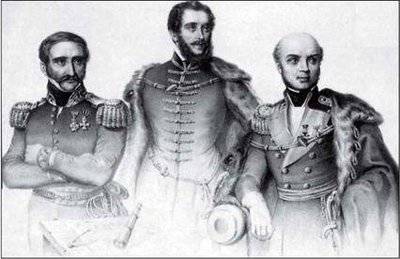
Did the Russians want the war? Contrary to the common story about the order of Nicholas I to saddle horses, after the news of the revolution in Paris, which was picked up by the court Soviet academician Yevgeny Tarle, the emperor was not going to fight. 15 in March Nikolai wrote to Paskevich: “Yesterday I issued my manifesto, he points out to everyone, and ours, and enemies, that I want, not touching others, but not allowing me to touch myself; This is my whole task ... We must remain in a defensive, almost cordoned state sur se qui vive, paying the most vigilant attention to our own edge, so that all attempts at home to tame at the very beginning. ”
Also received and government officials of Russia. Chancellor K. Nosselrode pointed out to N. Kiselev, the ambassador to France, that Russia: “wants peace and preservation of the territorial order in Europe, established by the Paris and Vienna treatises ..., it will not take any part in internal divisions that may arise; it will in no way affect the choice of government that the people wish to choose. ” In essence, Nicholas I recognized the right of peoples to self-determination and did not even break off relations with the new French republic.
Paskevich wrote to the emperor that the Austrians "want B (our) to (Catholicism) to deign to bear the brunt of the war." To which Nikolay replied: “There is no reason to enter Transylvania. This is a matter of the Austrians ... When the whole matter is flawed, it would be foolish for the Russian blood to correct their mistakes. ”
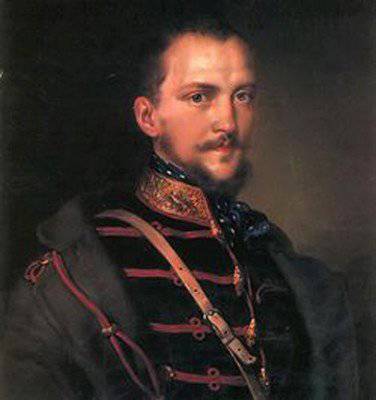
Yes, and before the war, was Russia itself, especially on foreign territory? The crop failures 1848, struck the Volga, Black Soil, Ukraine and the Urals. To top it off, locust attacked the fields. Sush contributed to the spread of fires, Penza, Kherson, Orel, Saratov, Kazan burned. The picture is completed by the results of a cholera epidemic that claimed more than half a million lives.
The budget of the year 1848 was reduced with a deficit of 32 million rubles. Gold and silver in substantial quantities were withdrawn from the basements of the Peter and Paul Fortress for sale abroad. They were not going to fight, but the sad experience of the 1830 Polish riot of the year forced the Defense Ministry to “scratch”. The reserves were pulled up to the border, and in the south they deployed a “rapid reaction force” in the form of a “volatile corps” (6 infantry regiments, cavalry division, 2 Cossack regiment, sappers battalion). They did not want to fight, but had to ...
So why, why? The intervention could not have happened if the revolution had not reached the border Danube, in connection with which the Russian forces strengthened the Moldovan grouping and the Hungarians began to really threaten Vienna. Then the Austrian Caesar, who arrived in Warsaw to the Emperor Nicholas and the governor of Paskevich, begged military help from the Russians.
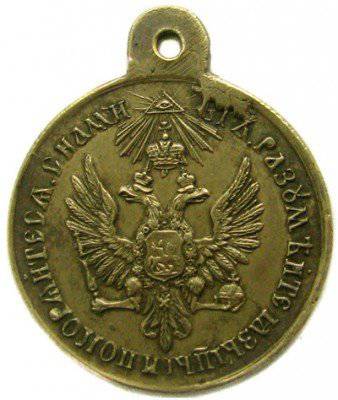
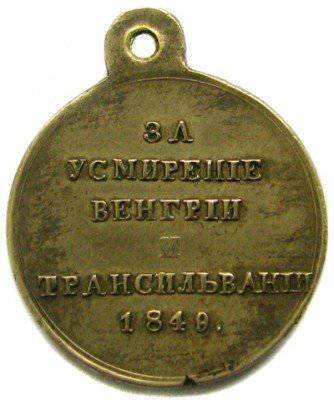
The decision was not given immediately. The emperor wrote to Paskevich: “This edge is threatened by an invasion from Transylvania with the help of the Poles and any rabble; if it will be so, our troops will enter according to Seret, although, I confess, I really do not want this. " But when detachments of calmer Polish troublemakers Jozef Bem and Heinrich Dembinsky appeared near the borders of Russia, the decision was made. The introduction of a limited contingent of Russian troops into the neighboring state was due to the real threat to the stability of Russia itself. Nicholas, whose reign began with the Decembrist rebellion, did not tolerate revolutions in principle, and was ready to help Austria, relying on, in modern terms, the “accepted system of international relations” - the Holy Alliance.
In addition, the emperor reserved the possibility of maintaining influence on the Austrian leadership, especially in helping the Balkan Slavs, for whom Magyarization was worse than the Austrian oppression, and therefore they voluntarily joined the ranks of the Austrian army and fiercely fought against the Hungarians, such as, for example, the Highlanders. moses
By the way, in Russian society, by tradition, opinions are divided. Ivan Turgenev was convinced that “the revolution was ruled by evil power in the face of rich bourgeois and financiers, the unfortunate people served as a toy in political struggle” and supported the campaign, and Nikolai Chernyshevsky in his 1849 diary called himself “a friend of the Hungarians” and expressed hope for the defeat of the tsarist troops. We can not forget the "then London Herzen," who introduced the term "gendarme of Europe".
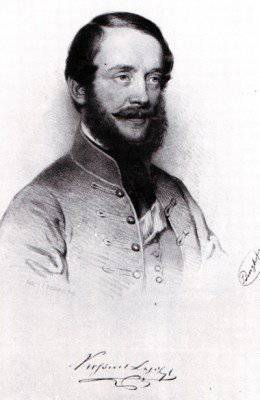
It is noteworthy that the invasion was discussed with European offices. He was supported by Lord Palmerston, and the hero of Waterloo, the duke Arthur Wellington, proposed to crush the Hungarians in general with one powerful blow.
Start hike. The task of restoring order fell on the shoulders of the old friend of the tsar and Ivan Paskevich, who was tested in battles. He achieved two principled positions - the Russian troops should operate autonomously, and their base should be located in Galicia. To protect Vienna, General Panyutin's Combined Division was transferred there, which was the first railway transfer of troops in the history of the Russian army.
And after Paskevich, with his usual economy, he began to prepare for war. For a man who had the experience of "small wars" in Poland and in the Caucasus, it was obvious that even the slightest requisitions of the population could cause a guerrilla war. Hope for the help of the Austrians (as it turned out) in the supply was not necessary. But the main thing, and this is underscored by Paskevich’s letters, was not the desire to shed Russian and Magyar blood for nothing. A commander with half a century of experience said that it was necessary to deal with insurgents "not with battles, but with maneuvers." It is curious that it is precisely such “indecision” that Paskevich is accused of by his opponents and enviers.
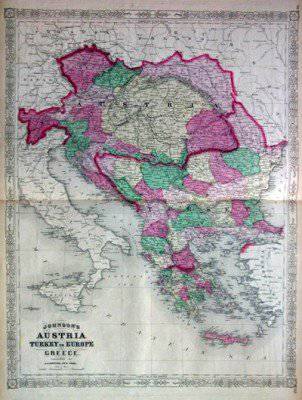
The Russians were opposed by the regular army with the experience of victories - 25 infantry battalions, 18 regiments of hussars, 400 guns and almost 150 battalions of the Honduran militia.
21 June 1849, the Russians moved in two directions: the commander of the 5 corps Liders went into Transylvania, and Paskevich’s army entered Galicia. But the Russians broke into Transylvania not by the whistle of Cossack gangs and shooting volleys. In cities and villages, Russian troops were greeted with a bell ringing, flowers and wine.
The reports stated: “The inhabitants of Hermannstadt went out to meet the village of Shelemberg, from where a lot of people and many crews accompanied us to the city. Regimental music met us there. From the windows we were showered with wreaths of flowers. ” Similar happened in Galicia. The corps commander, Adjutant General Count Ridiger, testified: "... Despite all the tricks of the Hungarian government to arm the people against us in all the places through which the corps entrusted to me passed, the inhabitants remained in their dwellings without thinking about armament."
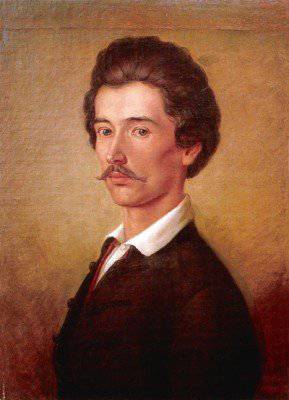
Of course, the foregoing does not detract from the negativity from interfering in internal affairs, but the same Paskevich writes to the king: “I don’t know your thoughts about Austria, but if its existence is necessary for your policy, then an amnesty is needed and the old constitution is needed.”
Military historians fairly reproached Paskevich for sluggishness and uninterrupted marches, which de are not responsible for the “Suvorov school”. But on the other hand, no one (even the Hungarians themselves) reproached his troops for excessive cruelty. In the conditions of the outbreak of cholera, the army went around half of Transylvania, exhausting both itself and the enemy.
No sooner said than done! Field Marshal Paskevich professed just such a position. Taking up the job, he quickly and without any losses completed the task.
The commander-in-chief of the Hungarians, the talented Arthur Herghey, tried to go to Pest where to organize his defense. The Russians were awaited by heavy battles near Weizen and Loshonc, and also the battles in Transylvania, where the heroic warriors of Bem faced Liders. A fierce battle took place near Shegesvár, during which Sandor Petofi allegedly died.
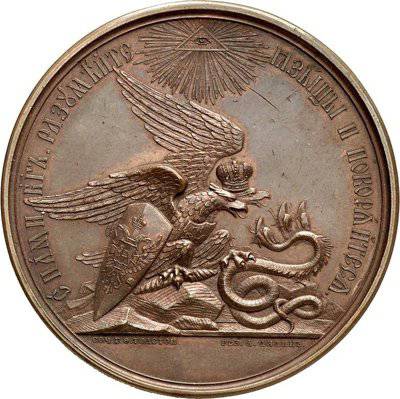
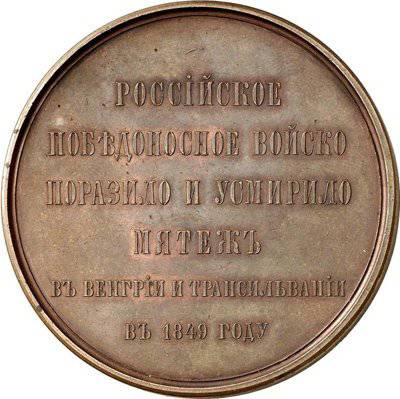
1 August Arthur Gergey in the vicinity of the village of Vilagosh near the city of Arad laid down his arms with a thirty-thousand-strong army with 144 guns. The Russians treated the Magyars as worthy opponents and kept their weapons. However, the Austrians demanded the release of prisoners. Paskevich did not want to do this, and wrote to the king: “May I give to the gallows all who hope for your goodness? Just because they surrendered to your troops? ”
Magyar was handed over under the guarantee of life preservation by the Austrians, however, the majority were sentenced to death, 13 generals went down in history as the martyrs of Arad. Emperor Nicholas I, wanting to alleviate the fate of the Hungarians and their leaders, even sent his heir to Vienna and asked Franz Joseph to give Gergey to him for bail, and they saved his life.
The clean-up operation was completed in a short time. The army proved its fighting efficiency, shone the names of the commanders Gasford, Panyutin, Zass, Labyntsev, Tolstoy, colonels Khrulev, Baumgarten, captain Alekseev and Dekonsky, the future governor of the Zabaykalsky region Zhukovsky and the hero of the Khiva campaign of General Verevkin. For the entire campaign, the Russian army suffered combat losses in 708 people, while about 9 thousands carried cholera ...
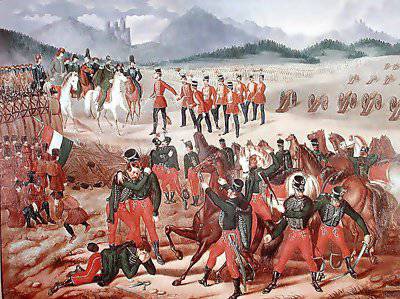
The question of the feasibility of such an operation has caused and will cause controversy. The emperor then stood before duty and desire, realizing how the Austrians "would thank for help." According to the stories, Nikolai Pavlovich told the Austrian envoy, Count Georg Esterhazy: “Do you know two of the silliest kings of Poland? I'll tell you: those were Jan Sobessky and me. We both rescued Austria, but did not reward them for it. ” So it soon happened when Austria actually betrayed their rescuers in the Crimean War.
Of course, the Hungarian campaign of Paskevich cannot be regarded as an exclusively peacekeeping operation. Democrats will see in it the indispensable attributes of reactionary and totalitarianism. But the Hungarian revolution was unable to unite the peoples, but on the contrary, it separated them and led to a civil war. And, it would seem, Paskevich’s punitive campaign against the Hungarian revolution became de facto salutary for residents of other nationalities and cultures. Peace was returned to the empire by force, but it took time ...
Victor SHESTAKOV, Poltava Region
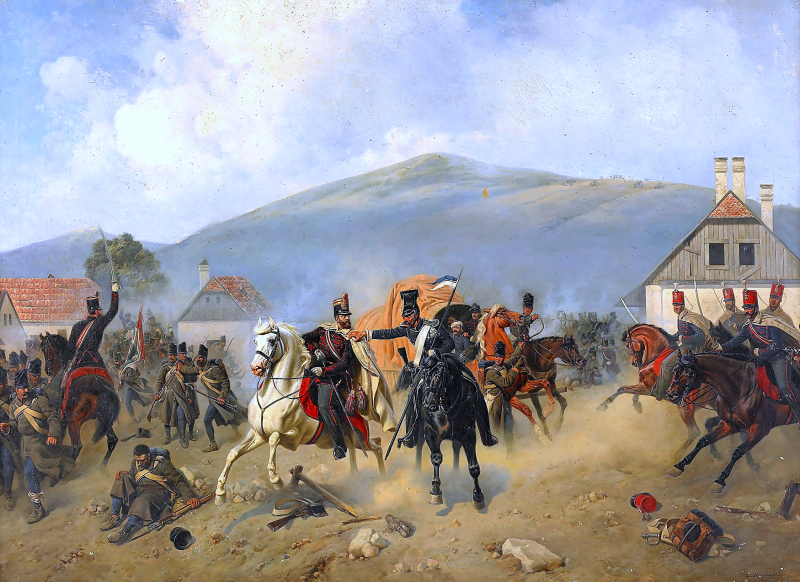
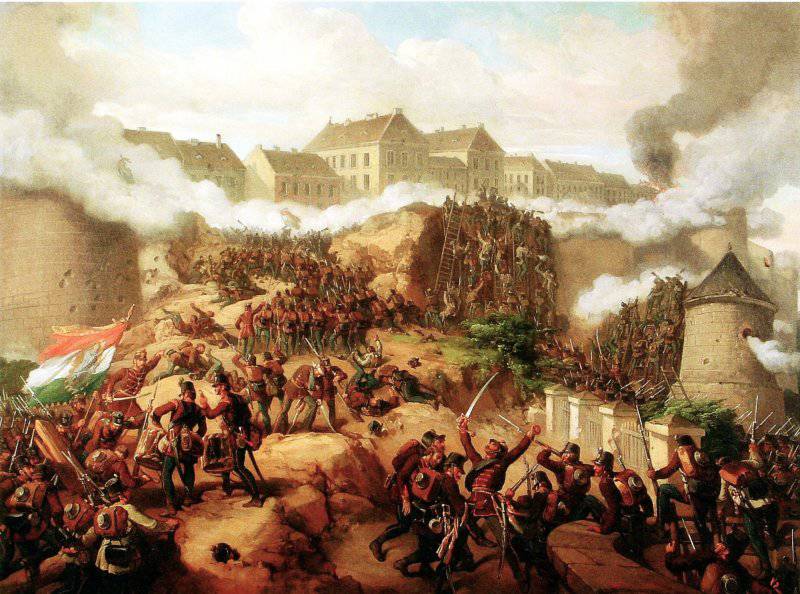
Information